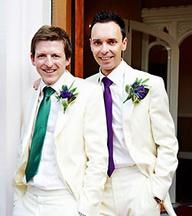This week, the Supreme Court will hear two cases impacting laws on same sex marriage. The first is a suit challenging California’s law defining marriage as a legal union between a man and a woman. The second case is a challenge to the 1996 federal Defense of Marriage Act (DOMA), which for purposes of federal benefits also defines marriage as a union of one man and one woman.
The most basic question at the heart of the debate over same-sex marriage is whether the US Constitution protects a fundamental right to marry regardless of sexual orientation. However, there may be another way to look at this question. Look at it as a contract.
Marriage is a contract between two individuals. It is sanctioned separately and differently by religion, and by the state. Religion establishes the moral dictates of this contract, the relationship and the obligations of that relationship as it pertains to those being married, their progeny, and others in the religious community. These relationships and obligations are similar between religions, but there can be significant differences in religious laws. The relationship of husband and wife and the obligations of one to the other can be vastly different in different cultures with different religions.
The reason for the state to be sanction a marriage contract are laws of inheritance and taxation among others areas of concern. There are laws concerning sexual activity between consenting adults. The implications of these laws may be affected by the state definition regarding who is married, and who is not. Other laws pertaining to spousal protection against testifying against one another, who has the right to determine health care for the other as well as final arrangements following death, who may visit and be informed by health care providers regarding the condition of the other are all affected by by how the state defines who is married and who is not. Not being a lawyer, I am aware that these may be only a few of the significant legal implications of defining who is married. In my opinion, this is the primary and only function of the state in this issue: how to apply laws to people who have chosen to live together. People who live together can choose to change how these laws are applied when they choose to get married under state law. This is the implication of obtaining a marriage license from the state. There are people who choose to get married in their religion, but not to obtain a state issued marriage license. They have chosen to enter into a moral contract between themselves, a moral and ethical commitment to each other, but not the legal contract. Their clergy has decided to complete that moral contract by performing the marriage ceremony prescribed by that religion.

It seems logical that we should look at this issue differently when it comes to state or federal law. Legislators should evaluate their definition of marriage looking only on the beneficial effect this definition will have on the way existing laws are applied to two individuals who agree to enter into the legal contract of marriage.
Since we choose to separate church and state, this doctrine should be equally applied to marriage.
The legal contract and the application of state and federal law should be defined by state and federal law, and it seems to me to be beneficial to both institutions to define this as being a contract between two consenting adults, leaving the decision regarding the moral contract to our guardians of morality, religious leaders. States should have no right to dictate morality to clergy by defining who they will marry, neither should any religion define marriage for the State. The people may exercise their right to dictate the application of the moral contract by influencing their own clergy based upon their agreement regarding the teachings of their religion thereby affecting who that clergy member will marry.

You will note that this discussion has neither condemned nor condoned same sex marriage. That is a decision which belongs in the moral environment of each religion. However, this discussion does not arrive at any conclusion regarding the State contract, other than it would seem to be favorable to define it as the relationship between two consenting adults, irrespective of the gender of those adults. This would clarify many issues.
Some may say that it is bad for children to be raised by same sex parents. However, the American Academy of Pediatrics has just issued a position statement to the contrary.
One of the best expositions on the upcoming debate at the Supreme Court has been recently published in the Christian Science Monitor. It is notable that this issue regarding the difference between the State Contract of marriage, and the Religous Contract of marriage has not previously been raised. Perhaps it should be if we are to separate the functions of the Church from the State.
I am left to question why it is not in the best interest of the state to define marriage as the union between two consenting adults. Please help me to understand but be careful to avoid discussion based upon morality, right and wrong, as the justification for not allowing these unions to take place. That belongs in the Houses of Worship, not in the Houses of Congress, or the Supreme Court. I thank you in advance.
